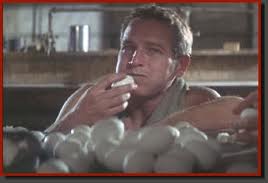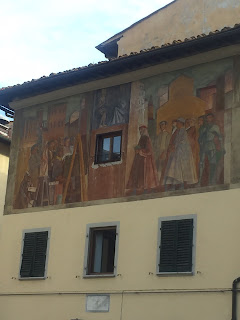Cool Hand Luke and the Futility of a Plastic Jesus
My son the film connoisseur and I were talking about movies
a couple of weeks ago and I mentioned Cool
Hand Luke (1967) because we had just seen Paul Newman in Butch Cassidy and the Sundance Kid. So I got a copy of Cool Hand Luke and we watched it.
For me, it was the first time in maybe twenty years that I had seen
it. This time, though, I was struck by
all the symbolism and deep meaning embedded in the movie. I guess graduate school does that for you. You see just about anything and feel
compelled to deconstruct it. I was really struck by how the film uses Paul
Newman´s character, Luke, as a post-modern Christ figure to make a strong statement
about religion and society.
Religion is soaked into the fabric of this movie that is set
in a North Florida prison work gang. A
young Dennis Hopper plays the mentally challenged Babalugats, and we see him
early in the film on his knees babbling in unintelligible prayer just before
climbing into his bunk for the night. He
concludes by inverting his interlocked hands to view his fingers in the last
line of the child´s rhyme “This is the church, this is the steeple, open the
doors and see all the people.” The inmates
who are musically inclined usually play and sing hymns and church songs. Dragline, played by George Kennedy, who won
an Oscar for Best Actor in a Supporting Role, explains his crimes to Luke and
pauses to point and look skyward saying loudly, “But I loved my neighbor” and
mumbling, “and his wife.”
The prison bunkhouse rules, explained by Carr the
floorwalker, happen to be ten in number, and are punished with draconian
certainty by a night in “the box,” an outhouse-sized structure away from the
rest of the inmates. Strother Martin plays the sadistic Captain in charge of
the prison, and in the small incarcerated universe he represents the authority
of Almighty God, occasionally coming off of his porch rocker to smite a wayward
inmate with special punishment. The
inmates in their humanity are incapable of observing The Law to the letter on a
consistent basis. They fight in the
shower, although Carr clearly tells them that any “grab-assin´ or fightin’”
will earn them a night in the box.
Similarly, several inmates are still walking around the bunkhouse when they
are required to be in their bunks when second bell sounds. Leg irons and chains can be seen and heard on
the inmates who have previously attempted an escape.
Into this environment comes Luke, a Korean War hero
condemned to serve two years for using a pipe cutter to remove the heads from
parking meters in his small town. He
immediately shows a marked distaste for the laws of the prison, both the
official ones propagated by the authorities and the informal ones enforced by
the older inmates against the “new meat.”
Soon the messianic imagery is attached to Luke, who offers himself up to
be savagely beaten by the inmates´ enforcer (who later becomes his best friend)
Dragline. His act of “propitiation” for
the other men is to eat fifty hard boiled eggs in an hour. In literature the egg often represents the
soul and, as Roger Ebert has pointed out, the inmates were fifty in number. Unlike the original Christ, Cool Hand Luke
seems to have the earthly mission of proving God´s absence, silence or
uselessness. When the whole work gang is
caught outside in a lightning storm, Luke stands out in the open, shouts at God
and asks for proof of His existence, eventually concluding that he was doing
nothing but standing alone in the rain.
When he receives news that his sick mother has died, Luke picks up his
banjo and sings the “Plastic Jesus” song that parodies the relic veneration in
some Christian denominations. Cool Hand
Luke´s gospel is one of personal freedom, to trust and look out for and please
oneself. This ethic of individualism is ultimately
made clear when Luke bellows at his fawning comrades, “Stop feedin´ off me!” His miracle of eating the fifty eggs, unlike
Christ´s multiplication of the loaves and fishes to feed the 5,000, only feeds
himself.
Several episodes involving Luke are evocative of crucifixion
and burial. Upon completion of Luke’s eating
of the eggs, we see a top-down shot of him sweaty and exhausted, stripped to
his boxer shorts, lying on a table on his back with his arms straight out and
his legs crossed. Early in the film, when
we see another inmate locked into the box, an old lock is used. When Luke is locked in the box late in the
film, though, a wooden crossbeam is fitted into two upright supports across the
door. Luke seems to finally be broken by
two of the guards when, after being starved for four days in the box and then
forced to finish a brutal workday in the heat, he is forced to dig, then fill,
then re-dig a ditch in the prison yard while the rest of the prisoners enjoy
their Saturday off. The other prisoners
attempt to motivate him with music from the bunkhouse and when he gets neck
deep in the hole he has dug for the second time, the song changes to “Ain´t No
Grave Gonna Hold My Body Down.” We then
realize that he is digging a perfect grave-sized hole and all doubt about the
metaphorical use of the task is erased when one of the guards kicks Luke down
into the bottom of the pit and he assumes a perfect corpse position in his
exhaustion. Luke is finally broken in
this episode and begs the “bosses” not to hit him anymore under the stunned
silence of the rest of the inmates. He
is then allowed to go back to the bunkhouse where his disciples all turn their
backs on him. Their messiah turns out to
be as human as any of them and his apparent weakness shocks them into a loss of
faith.
When Luke later escapes for a third time, though, a final Gethsemane
awaits him in a dark, empty, dilapidated church. Luke
prays for God´s guidance and is instead unwittingly betrayed by his friend,
Dragline and shot by one of the bosses who waits outside. The movie´s message seems to be that God
doesn´t exist, or if He does, He is the ultimate “hard case” who can´t be
bothered to answer prayers for justice or to relieve human suffering.
The most famous line of the movie is “What we have here is failure
to communicate” and the Captain´s words mean more than he intends. The movie does show a situation of
communication breakdown: between men and between God and man. It could be that what should have always been
a message of liberation and redemption has been lost in a rules-based
church-society duality. If prohibitions
are all Christianity offers people, no wonder so many people opt for a life´s
mission of pleasing themselves.
It may be time to refocus the message. Luke 4: 16 - 21



